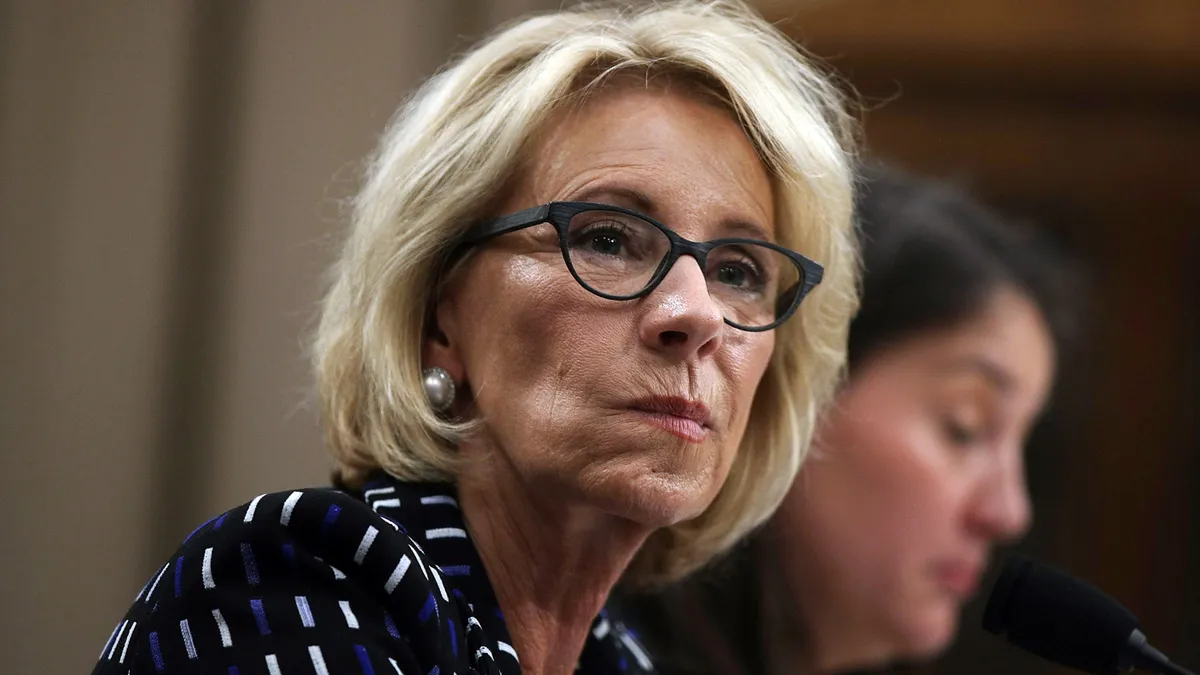UPDATE: Sep. 28, 2020: In a letter to chief state school officers, Secretary of Education Betsy DeVos said the department will not appeal the courts' decisions, which ruled against the interim final rule. Districts that chose to follow the rule will not be penalized, but going forward the Ed Department said it would "use our enforcement authority aggressively" to ensure districts aid private schools. Districts should now allocate funds for private schools based on the number of children from low-income families who attend those schools, according to the letter.
UPDATE: Sep. 11, 2020: In a separate lawsuit filed by the NAACP, Colorado's Denver County School District No. 1, California's Pasadena Unified School District and others, a federal judge declared the U.S. Department of Education's rule unlawful. A fourth lawsuit was brought against the department and U.S. Secretary of Education Betsy DeVos in August, this time in Maryland by the Council of Parent Attorneys and Advocates.
UPDATE: Aug. 31, 2020: As part of a separate case brought by Michigan, California and several other states, another federal judge has ordered a preliminary injunction against Secretary of Education Betsy DeVos and the U.S. Department of Education. In his decision, Judge James Donato said the department's interim rule on CARES funding distribution is "'interpretive jiggery-pokery' in the extreme" and goes against what Congress intended. The motion impacts Pennsylvania, California, Hawaii, Maine, Maryland, Michigan, New Mexico and Wisconsin, as well as major districts like Chicago Public Schools and the New York City school system.
Dive Brief:
- A federal court in Washington has ordered a preliminary injunction against the U.S. Department of Education and Education Secretary Betsy DeVos from implementing an interim final rule on distribution of Coronavirus Aid, Relief, and Economic Security (CARES) Act funding, which the judge said would cause public schools in the state "great" and "irreparable" harm.
- The interim final rule, issued in late June, compelled districts to choose between a poverty-based and an enrollment-based formula in their distribution of CARES funds. The former would require districts to fund only Title I schools while also distributing funds to low-income students in local private schools, and the latter would require districts to allocate money for private schools proportional to their enrollment if they choose to provide emergency aid to all public schools.
- In her decision, Judge Barbara J. Rothstein rejected DeVos' claims the Education Department's interpretation is equitable and aligns with the intention of the law, calling the rule "a stretch" and its claims "remarkably callous, and blind to the realities of this extraordinary pandemic."
Dive Insight:
When the interim final rule was released, districts and education organizations immediately expressed concern funds would be misdirected to private schools. Rothstein said as such in her decision, adding the department's rule was "forcing the State to divert funds from public schools," which "ignores the extraordinary circumstances facing the State and its most disadvantaged students."
An analysis by the Learning Policy Institute shows if all districts choose to spend their federal emergency aid on all public schools rather than just Title I schools, they would also have to provide over a billion more to private schools. Some legislators on both sides of the aisle have questioned this rule.
Religious and other private schools have asked districts to divvy up the CARES funds with them, saying they also are suffering financially from the pandemic.
"It's made relationships between public and private entities more strained," said Sasha Pudelski, advocacy director for AASA, The School Superintendents Association, noting private schools in some cases have threatened public schools with lawsuits.
Pudelski said the judge's decision to move forward with the injunction "got it right on the money and hit the right tone." The order will prevent DeVos' rule from going into effect until there is a full trial.
The decision to block DeVos' rule only applies to Washington schools impacted by the lawsuit. But with two additional cases ongoing in California (joined by Michigan) and Washington, D.C., it's likely this case could have some national influence, said David Bloomfield, a professor of educational leadership, law and policy at Brooklyn College in New York.
For the rule to be blocked nationwide, though, either all jurisdictions would have to join in and win lawsuits to stop it from going into effect; the case would have to work it's way up to the U.S. Supreme Court; or the Education Department could withdraw it, Bloomfield said.
"The administration frequently tries for a far-reaching policy decision, and withdraws it once slapped down by the courts," the lawyer said, adding its possible the department will "see the handwriting on the wall."
"We are following the law," said Education Department spokeswoman Angela Morabito in a comment to Education Dive, adding that the CARES Act requires federal funds to help all students, and the current rule treats all students equally. "It’s unfortunate that so many favor discriminating against children who do not attend government-run schools."
Bloomfield suggested districts nationwide now will likely allocate CARES funds based on student need, rather than enrollment, which will increase the amount available for public schools. And it's unlikely the Education Department would sue if districts made that decision, he said, because of the federal court decision.
In other places, Bloomfield said, some districts that preferred to distribute funds to private schools, too, "may have shoveled the money out the door as fast as they could."
However, although this is a win in Washington state for public schools, Pudelski said it's likely districts that have already distributed their CARES money based on the rule won't recuperate them and that private schools will be able to keep the dollars.
Districts under this particular case's jurisdiction would have the right to sue for reimbursement, Bloomfield said.







 Dive Awards
Dive Awards








